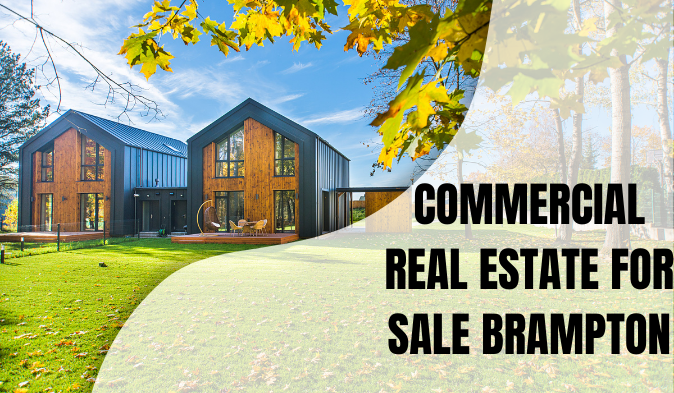
Commercial Real Estate in Brampton is any property that can make money through capital gain or rental income in Brampton.
Office buildings, duplexes for rent, restaurants, and even a warehouse are all types of business property.
If you can make money by renting it out, hanging on to it, or selling it again, it’s a commercial property.
What makes commercial real estate different from residential real estate?
There are four main ways that commercial real estate is different from private real estate:
Investing in Commercial property vs Residential property commercial property usually requires a bigger down payment than residential property, but the possible return rate is also higher.
However, you may also be taking on more risk, especially if you rent to retail or industrial renters during a bad economic period.
One good thing about being a commercial real estate owner or investor is that you can take advantage of triple-net leases.
These let the tenant pay for things like property taxes, repairs, and insurance.
Commercial real estate is different from residential real estate in that you usually can’t live there.
A good thing about this is that you usually work directly with business owners (a B2B relationship) instead of renters (a B2C relationship). Landlords who rent to businesses are more likely to follow the rules of the lease and pay rent on time.
Longer lease terms in business real estate can help you keep your cash flow more stable, and tenants like healthcare providers and government agencies can give you peace of mind even when the economy is bad.
The bad thing is that investing in commercial real estate can be harder than investing in residential real estate.
Most commercial owners know a lot about commercial property law or have a team of experts on hand to help them get through the red tape that comes with doing business in commercial real estate.
Different kinds of commercial property can be anything from industrial space to restaurants and open land, but most of the time, it falls into one of six groups.
There are two main types of office buildings in cities and the suburbs. There are skyscrapers and other high-rise buildings in towns that are used as office space. Some of them can be as big as a few million square feet.
Most office buildings in the suburbs are smaller and are sometimes grouped in office parks. Office buildings can have one or more tenants, and many of them are built to fit the needs of the tenants.
They are also put into three groups, called Class A, Class B, and Class C. The Building Owners and Managers Association International (BOMA) says this:
Retail Shopping: Retail shopping includes the stores and places that we visit. They can be multi-tenant (often with a lead tenant or main tenant that brings people to the leased property) or single-use buildings that stand alone.
In the retail industry, there are a lot of factors that affect what kind of shopping centre is built. These factors include the trade area, size, idea, types, and number of tenants.
You can find single-tenant buildings in big-box stores (like Target, Walmart, Best Buy, or Dick’s Sporting Goods) or pad sites (single-tenant buildings in a shopping centre, usually a bank, diner, or drug store).
Industrial: Industrial buildings are usually found outside of cities, especially along major transportation routes, and are used by a range of businesses. This type of low-rise building can also be put together to make industrial parks.
There are four different types of properties:
For example, research and development (R&D) facilities have their own type of industrial zoning. It’s important to remember that industrial land use has its own set of zoning rules.
Multifamily:When the same person or business owns five or more homes, that property is called commercial real estate.
The multifamily sector includes all types of living property that aren’t single-family homes. This includes townhouses, condos, apartments, and co-ops. Class A, B, and C are common names for residential buildings, just like for office buildings.
In particular, apartment rental houses are split into different types of properties. Freddie Mac put them into six different groups:
Hotel: Businesses in the hotel industry offer lodging, meals, and other services to tourists and travellers. One type of hotel is independent (boutique), and the other is flagged, which means it’s part of a big hotel chain like Marriott or Sheraton.
They are broken up into six different groups by Real Capital Analytics:
Special-purpose: Business real estate owners may own special-purpose real estate, which only fits into some of the other categories. Specialty sites include places like fairgrounds, churches, self-storage units, and bowling alleys that are open to the public.
How should one begin their career in the commercial real estate sector?If you want to add variety to your investments by buying business real estate, you should first learn about the different kinds of investments you can make.
Direct investment: If you have a lot of money and a lot of information, direct investment is the easiest way to put your money into commercial real estate.
For a direct investment, you’ll work with a real estate agent or broker to find a property to buy. After you buy it, you can either rent it out and handle it yourself as the landlord or hire a property manager to do it for you.
Indirect investment: This is a way to invest in commercial real estate, even if you have a limited amount of cash or know a lot about CRE.
Investors can use REITs, crowdfunding, and ETFs to put money into properties without having to take care of them fully.You can buy stock in a company that buys, sells, and rents out business properties instead of buying the property yourself.
As a limited partner, you’ll get a share of the investment returns without having to make day-to-day decisions about the business property.
Different ways to invest indirectly in Commercial Real Estate in Brampton
If you want to get started in commercial real estate, the best things to do are read commercial property blogs, listen to commercial real estate talks, and use social media groups and market research to learn more about your local market.
What are the pros and cons of buying a business property?Analyzing the pros and cons of buying a business property can help you choose if it’s the right choice for you.
For owners, investors, and renters, commercial real estate has a lot of ways to make money, but it’s only for some. It is also important to know Importance of Home Inspections in Brampton. Finding out more about the commercial real estate (CRE) business can help you understand it better and give you new ways to grow your business or broaden your investments.
RELATED POSTS
View all



